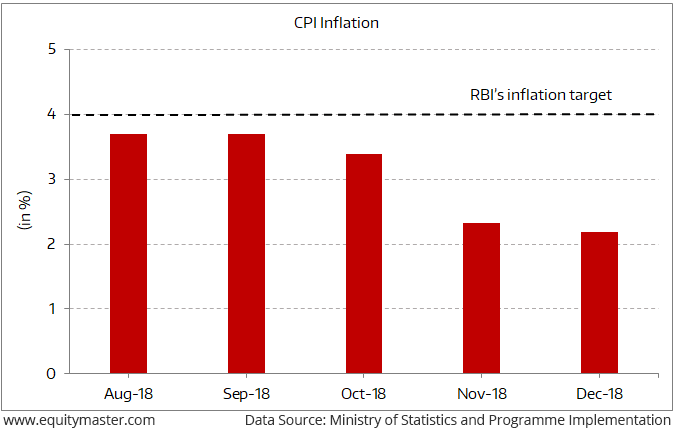- Home
- Todays Market
- Indian Stock Market News April 4, 2019
Sensex Trades Flat; Banking Stocks Under Pressure Thu, 4 Apr 12:30 pm
Indian share markets are trading range-bound, ahead of the Reserve Bank of India (RBI) policy announcement. The BSE Sensex is trading up by 57 points (up 0.2%), while the NSE Nifty is trading up by 7 points (up 0.1%). The BSE Mid Cap index is trading up by 0.1% and the BSE Small Cap index is trading down by 0.4%.
Sectoral indices are trading mixed with stocks in the oil & gas sector, IT sector and metal sector witnessing maximum selling pressure while realty stocks and automobile stocks are witnessing buying interest.
This will be the last RBI monetary policy announcement before the general elections in India. RBI governor has clarified earlier that there is no liquidity deficit in the banking system.
RBI's monetary policy committee (MPC), led by Governor Shaktikanta Das, announced a 25 basis points cut in the short-term lending rate, also known as repo or repurchase rate, in its first bi-monthly rate review of financial year 2019-20.
The repo rate now stands at 6%. As per an article in The Economic Times, this was the second back-to-back rate cut by the six-member MPC ever since Das was appointed governor. The move made India the only country in Asia to have cut interest rates twice in three months.
Here's an excerpt from the article:
- GDP in the first half of FY20 may stay in 6.8 - 7.1% range while the same may jump to 7.3 - 7.4% in the second half.
Consumer price inflation was seen at 2.9 - 3% in the first six months of FY20, below the RBI's comfort zone of 4%.
Despite the central bank's continued open market operations (OMOs) and the dollar-rupee swap, systemic liquidity as of March-end was in deficit at Rs 400 billion. The tightness in liquidity was visible in high credit-deposit ratios and elevated corporate bond spreads.
Speaking of RBI's policy, in 2016, the RBI adopted an inflation target of 4% (+/-2%) for next five years under the monetary policy framework.
However, it is evident from the chart below that since August last year, inflation has stayed below RBI's target of 4%.
Actual Inflation has Stayed Below the RBI's Target
Here's what Sarvajeet wrote about it in one of the editions of The 5 Minute WrapUp...
- In December, CPI-based retail inflation declined to an 18-month low of 2.2%.
Currently, the RBI's policy stance was 'calibrated tightening'.
But with the recent inflation data, the MPC may change its monetary stance to 'neutral', even if it does not cut the repo rate.
In the news from the aviation space, Jet Airways share price has grounded 15 additional aircraft due to non-payment of amounts outstanding to lessors under their respective lease agreements.
Reports state that the total number of planes grounded because of default in lease rental payments, as disclosed by the airline, stands at 69.
According to a report, the company on Wednesday deferred the March salary payment to its employees, citing "complexities" involved in the finalization of the debt-resolution plan.
Shares of the company are trading 4% lower on back of the above news.
A government official recently said Jet's curtailment of operations would be reviewed over a period of three months before taking a call. A senior executive at Jet said there was a "grandfather clause", which protected a percentage of international flying rights once an airline had proven itself eligible for such operations.
Banks were to release an immediate additional debt funding of Rs 15 billion for Jet to tide through and part-pay its vendors and employees. People close to the matter said the funds had not been released yet.
Speaking of the aviation sector, while looking at the current demand-supply scenario in the aviation industry, it is important to look at how air passenger traffic is growing.
In February, domestic air passenger traffic reported its lowest monthly passenger traffic growth since January 2015. It registered a marginal annual growth of 5.6%.
Similarly, in January, the number of passengers flown by domestic airlines grew at 9.1% YoY, while in December, it increased by 13% YoY. This is way lower than the historical growth rate of 20% between 2014-2018 period.
As per Research Analyst Sarvajeet Bodas, a slowdown in passenger growth is due to several factors. These include frequent flight cancellations due to grounding of fund-starved Jet Airways' aircraft, pilot shortages faced by IndiGo, NOTAMs (notice to airmen) at various airports, and a rise in airfare etc.
In the last 5 years, we saw a surge of middle-class travelling by plane. But when the ticket price goes up, many of them prefer an alternate mode of transportation.
That shows the price sensitivity of the Indian consumer!
To know what's moving the Indian stock markets today, check out the most recent share market updates here.
For information on how to pick stocks that have the potential to deliver big returns, download our special report now!
Read the latest Market Commentary



Equitymaster requests your view! Post a comment on "Sensex Trades Flat; Banking Stocks Under Pressure". Click here!
Comments are moderated by Equitymaster, in accordance with the Terms of Use, and may not appear
on this article until they have been reviewed and deemed appropriate for posting.
In the meantime, you may want to share this article with your friends!